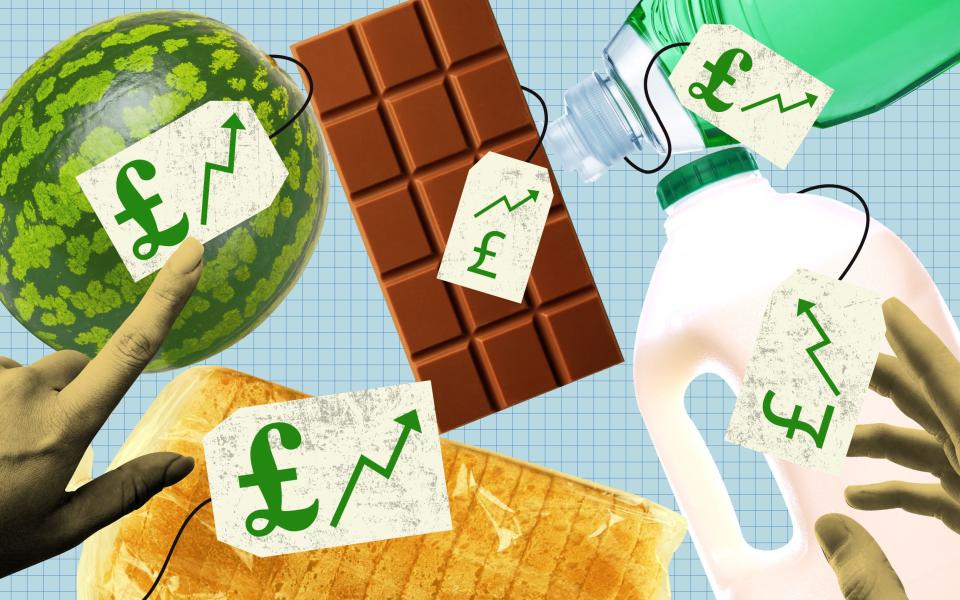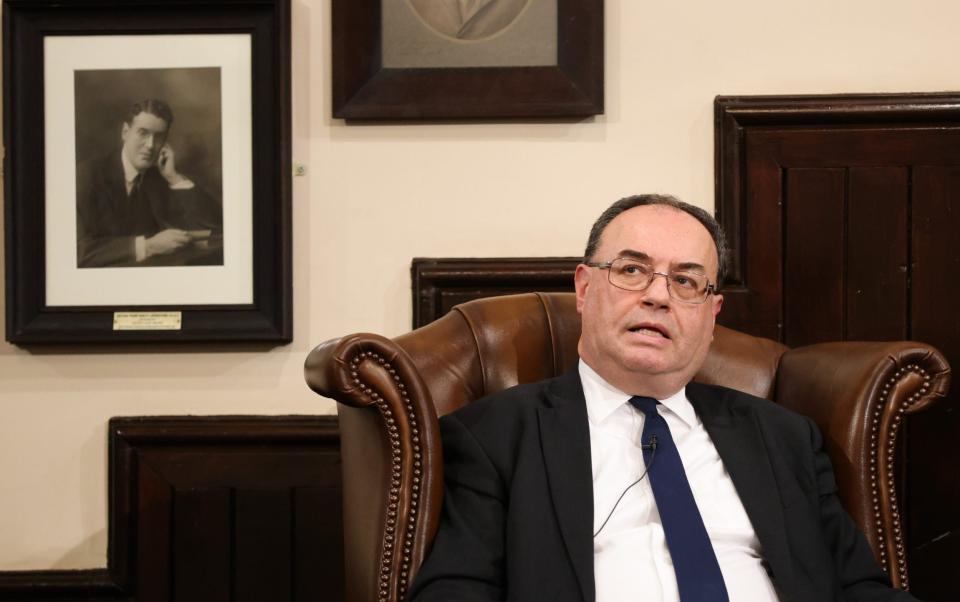Fresh Covid fears threaten to derail Bank's fightback against inflation

Huw Pill, chief economist at the Bank of England, insisted just days ago he was looking for “reasons not to hike rates” as inflation threatens to squeeze millions of British households next year.
But City economists are warning one may have just arrived in South Africa’s “Nu” Covid variant, which has sent panicked investors running for cover.
The strain spreads even more rapidly than the delta variant and scientists fear an array of mutations could help it evade vaccines. It poses a dilemma for the central bank, threatening to complicate its battle to control inflation.
Data since a November communications fiasco in which Governor Andrew Bailey and his colleagues led financial markets up the garden path on interest rates, before refusing to budge, has suggested a near-certain move on December 16.
Until Thursday, forward money markets were pricing in an 80pc chance of a rate rise from the March 2020 emergency setting of 0.1pc to 0.25pc.
Inflation is worse than expected at 4.2pc, vacancies sit at record highs amid a tight job market and retail sales are buoyant. While Covid is still making itself felt on the labour market, the direct economic impact of restrictions itself was disappearing into the rear-view mirror.
But enter the variant and the market has pulled back, making the December meeting a virtual coin-toss.
Pill’s speech to the CBI on Friday stuck partly to his previous script as he told listeners that he “scans incoming information for challenges” to the view that rates should rise in the “coming months”. But, in answer to questions, he also struck a note of caution.
Pill warned: “If there's a financial disruption, or if there's the onset again of a pandemic, and a lockdown, those are the type of events which clearly would change our view of the world. We hope those things don't happen, but we don't really know what the future holds. It's those unknown unknowns that are most difficult to manage.”
Even more colourfully, after quoting former Chinese leader Deng Xiaoping, he added: “Maybe I can quote another person, former heavyweight champion Mike Tyson, who famously said that 'everybody has a plan until you're punched in the face'.... We've laid out a plan here. But that plan always has to be conditional. And we have to have the flexibility to react to unforeseen events.”
While the Bank already predicted the recovery slowing to around 1pc in the current quarter as supply chain disruptions bite, those forecasts were conditioned “on an assumption that significant, widespread restrictions on UK and global economic activity are not reimposed”.
Rob Wood, chief UK economist at Bank of America, pointed out that “they don’t have to make the decision for three weeks”.
He added: “A new variant is not going to improve the growth outlook. It raises uncertainty and gives you an option value in waiting. Right now it means a December rate rise is less likely.”
Shoppers are armed with an estimated £180bn in pandemic savings but experts are uncertain at this early stage how they will respond, particularly after last year’s Christmas was ruined by the “alpha” Kent variant.
Anna Angell, a consumer behaviour consultant at Shift, said “polarisation” was likely: “In terms of actually changing behaviour, I still think you've got that sort of psychological distance with it not being ‘in your backyard’.”
While vaccines and boosters will bolster the sceptics, the fearful will use it as another reason to stay at home, she adds.
Meanwhile, Wood’s rolling web-based consumer survey of 6,000 people - already weakened thanks to higher inflation - reports greater savings rates in a sign of early retrenchment among consumers, despite the cash burning a hole in their pockets.
This new variant also comes when supply chains have already been stretched by previous Covid waves, intensifying potential inflation problems for the Bank of England.
Neil Shearing, chief economist at Capital Economics, said: “A virus-related surge in goods spending, or port closures, would exacerbate existing supply strains and add upward pressure to goods inflation.
“A new, more dangerous, virus wave could cause some workers to temporarily exit the workforce, and deter others from returning, making current labour shortages worse.”
But that inflationary impetus would likely be overwhelmed by the economic deadening of fresh restrictions if the UK was forced to follow countries such as Austria back into a full lockdown, despite leading the world in its vaccination campaign earlier this year.
Citi’s chief economist Christian Schulz warns the lessons from previous variants is that travel restrictions “cannot ultimately prevent” a new strain reaching these shores.
He adds: “For now, we continue to think a combination of booster shots, anti-viral treatments and consumer caution should see the UK economy through the winter without lockdown, but still with some notable lingering economic costs.
“If the variant turns out to be much more vaccine resistant than the beta [South African] variant, we may have to revise this assumption.”
Traders cut interest rate bets as Covid fears hammer FTSE 100
By Louis Ashworth
Traders are scrambling to cut their bets on a Bank of England rate rise next month as fears of a new coronavirus variant rocked global stock markets.
The FTSE 100 was down as much as 3.5pc an hour after opening on Friday, wiping about £63bn off the value of Britain’s biggest companies.
British Airways owner IAG and plane engine maker Rolls Royce were the biggest blue-chip victims, down by more than 20pc and 14pc, respectively.
Fears that the new Covid strain could lead to a new wave of lockdowns sent shockwaves through European markets, also inflicting heavy losses on France and Germany’s top indices.
The variant, which has been dubbed ‘Nu’, was first discovered by South African authorities earlier this week. Scientists have warned it may be the most worrying version yet, with an Imperial College London virologist saying it has a “horrific spike profile”.
Expectations that the Bank of England will hike interest rates next month were rapidly reassessed as traders braced for the possibility of further lockdowns.

Money markets priced in a 70pc chance officials will vote to increase the cost of borrowing on December 16th, which had been pegged as a certainty as recently as yesterday.
Emmanuel Cau, head of European equity strategy at Barclays, said a pullback in stocks was “logical” given many markets have been pushing all-time highs.
He said: “What is key is to find out whether current vaccines remain effective against the variants, or not. Covid uncertainty might force central banks to err on the side of caution.”
Nigel Green, from asset manager deVere Group, said equity markets would eventually shrug off the drop, as they did after the Delta variant rose to prominence earlier this year.
He said: “This wobble is likely to be temporary with markets remaining bullish for the time being.”
Liquidity is likely to be thin when US markets open as many traders are still away from their desks following Thanksgiving on Thursday, with the New York Stock Exchange only opening for a half day.
Mohit Kumar, a managing director at Jefferies, said that would “exaggerate market moves”.
Analysts at ING said the dollar was likely to strengthen as foreign exchange investors look for ‘safe havens’ for their money.
Francesco Pescole, a currency strategist at ING, said: “It looks like it is indeed going to be a very ‘black’ Friday for global risk sentiment.”
